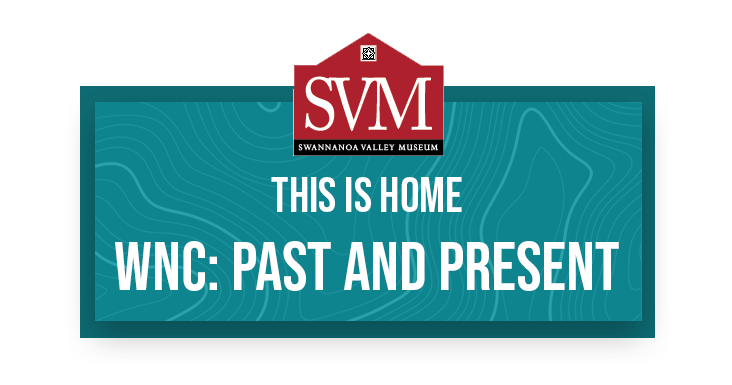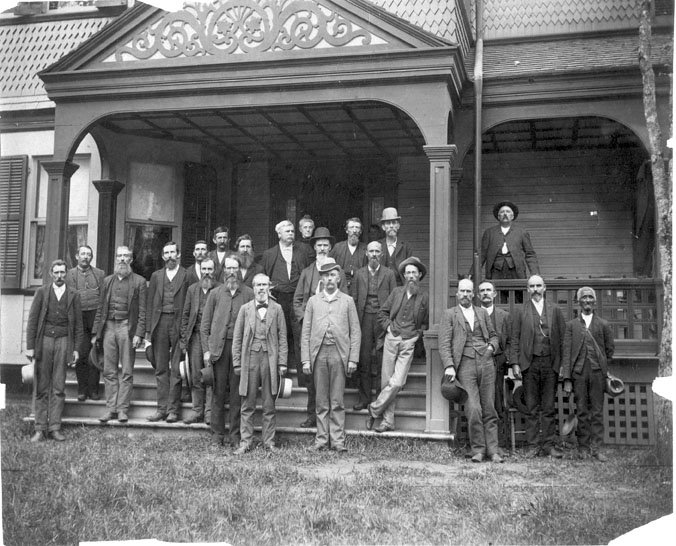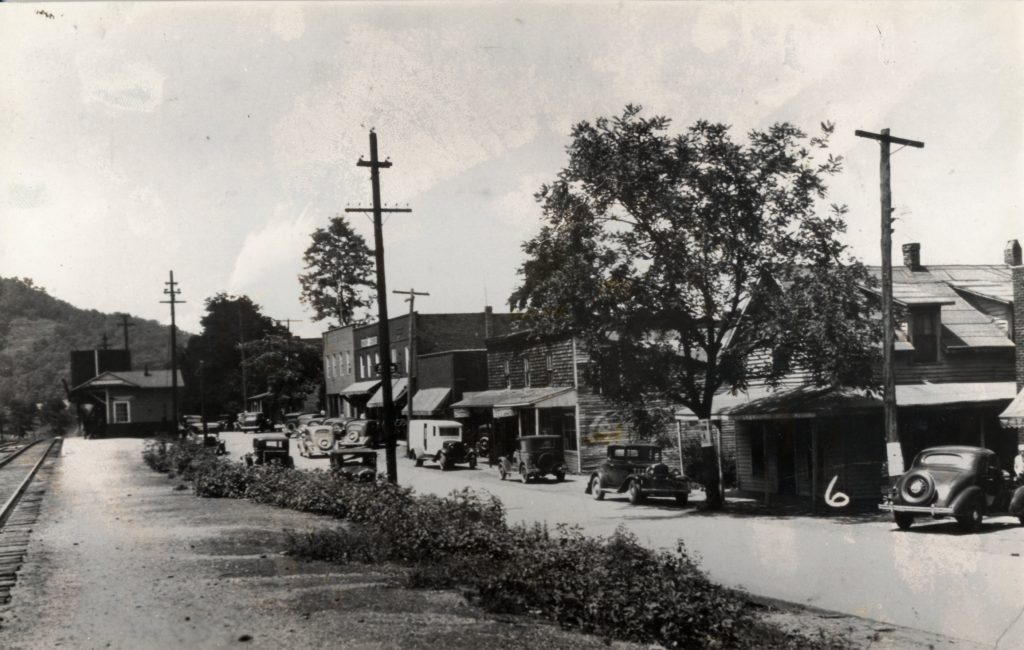
The Swannanoa Valley This is Home: Western North Carolina, Past and Present Series explores key historical, cultural, and ecological aspects of the Western North Carolina region with monthly evening lectures, taking place February thru November at the Assembly Room at Givens Highland Farms (200 Tabernacle Rd, Black Mountain, NC 28711). These hour-long meet-ups engage the many stories that have shaped the Swannanoa Valley as a place and look at the human and natural forces that have shaped the region, bringing these histories into a present-day context. Each presentation ends with a Q&A discussion bringing our shared history into context with contemporary issues. T
When & Where: WNC, Past and Present lectures take place once a month, February thru November on Thursday evenings from 6:00pm to 7:15pm at the Assembly Room at Givens Highland Farms (200 Tabernacle Rd, Black Mountain, NC 28711) unless stated otherwise. For attendees who are not residents of Highland Farms please park along Tabernacle Road by the Assembly Hall.
Cost: Tickets are $5 for museum members who use their promo code, $10 for general admission. Some fees may apply. If you are not financially able to afford to attend this series, please contact the Swannanoa Valley Museum at 828-669-9566 for scholarship availability.
Cancellation Policy:
We understand that unexpected circumstances may arise. You may cancel your enrollment in the program for a full refund up to 48 hours before the program start date.
- Cancellations made 48 hours or more before the program start date will receive a full refund.
- Cancellations made less than 48 hours before the program start date will not be eligible for a refund.
- A full refund will be offered if the museum cancels the program due to weather or unforeseen circumstances.
Please Note:
- We strongly recommend notifying us of your cancellation in writing via email to swannanoavalleymuseum@gmail.com
- You will receive a confirmation email upon processing your cancellation request.
2025 Entire Series Schedule
| Name | Date |
| **CANCELLED** Moonshine & Motorsports in Appalachia | Thursday, February 27th, 6:00-7:15pm |
| **CANCELLED** Viewing of The Last One *At White Horse Black Mountain* | |
| Civil War and the Aftermath in WNC ** at Christmount (222 Fern Way, Black Mountain, NC 28711)** | Wednesday, April 9th, 6:00-7:15pm |
| Conquistadors in North Carolina: Excavating the Berry Site and the Exploring Joara Foundation **The Cypress Room in the Prentice Lodge at Givens Highland Farms (415 North Commons Court, Black Mountain, NC 28711).** | Thursday, May 8th, 6:00-7:15pm |
| Postmarked Memories: Exploring History of the Swannanoa Valley Through Postcards **Givens Highland Farms (415 North Commons Court, Black Mountain, NC 28711).** | Thursday, June 26th, 6:00-7:15pm |
| Echoes of the Valley: The History of Swannanoa | Thursday, July 31st, 1:00-2:15 |
| Thursday, August 28th, 6:00-7:15pm | |
| Thursday, September TBD, 6:00-7:15pm | |
| Thursday, October TBD, 6:00-7:15pm (online ZOOM) | |
| Thursday, November TBD, 6:00-7:15pm (online ZOOM) |
2025 Upcoming Event Details & Registration

**CANCELLED** Thursday, February 27th: Moonshine & Motorsports in Appalachia
Dr. Dan Pierce, professor at UNCA and contributor to Moonshine & Motorsports Trail, will discuss the history of moonshining in North Carolina and greater Appalachia and how that birthed the multi-billion-dollar industry of stock car racing that we know today.

Wednesday, April 9th: Civil War and the Aftermath in WNC
**at Christmount (222 Fern Way, Black Mountain, NC 28711)**
On the 160th anniversary of Robert E. Lee’s surrender to Union forces , Steven Nash will address how the main issues of the Civil War period played out in western North Carolina. Addressing issues like the myth of a solidly Unionist Appalachia and the idea that slavery didn’t exist in the mountains, Nash will discuss what led western North Carolinians into a war that would transform their society. Using diaries, letters, and a variety of government documents, Dr. Nash’s talk will show how the Civil War and Reconstruction impacted the people of western North Carolina.
Steven Nash
Steven Nash is a Professor of History at East Tennessee State University. He is the author of Reconstruction’s Ragged Edge: The Politics of Postwar Life in the Mountain South (UNC Press, 2016), which received the Weatherford Award for Nonfiction awarded by Berea College and the Appalachian Studies Association. In 2010, he helped organize the Society of Appalachian Historians and helped plan its annual meetings through 2023. He maintains a strong interest in public history, serving as President of the Mountain History and Culture Group, a non-profit support board for the Zebulon B. Vance State Historic Site in Weaverville, North Carolina.

Thursday, May 8th : Conquistadors in North Carolina: Excavating the Berry Site and the Exploring Joara Foundation
**The Cypress Room in the Prentice Lodge at Givens Highland Farms (415 North Commons Court, Black Mountain, NC 28711).**
Mike Carpenter will discuss the Spanish exploration and occupation in North Carolina (1521 – 1587); discovery and excavation of the Spanish settlement of Cuenca and Fort San Juan in Burke County; and public opportunities made available by the Exploring Joara Foundation.
Mike Carpenter’s Bio
Mike Carpenter is a native of Catawba County, now living in Hickory with his wife Gina and their Maltese, Piper. He has helped with excavations at the Berry Site in Burke County since 2007. He served as a staff member of the Berry Site Archaeology Field School in 2022, 2023 and 2024. He has also helped with excavations at both the Town Creek Indian Mound in Montgomery County and the Carson House in McDowell County. He is on the Board of Directors of the North Carolina Archaeological Society and the Exploring Joara Foundation. The Exploring Joara Foundation educates and engages the public through hands-on archaeology and history programs, events, and opportunities to discover our diverse cultural and historical past with a focus on Native American and early colonial history. Exploring Joara is a 501(c)(3) non-profit organization.

Thursday, June 26th : Postmarked Memories: Exploring History of the Swannanoa Valley Through Postcards
** Givens Highland Farms (415 North Commons Court, Black Mountain, NC 28711).
Join Swannanoa Valley resident and local historian Mary Standaert for an engaging illustrated lecture exploring the history of the Swannanoa Valley through the lens of postcards. Drawing from her personal collection a, Standaert will highlight how postcards have captured the changing landscape, daily life, and cultural memory of the Valley for over a century.
In addition to the local focus, she will also trace the broader history of the postcard—from its origins as a utilitarian communication tool to its role in tourism, propaganda, and personal storytelling.
Mary Standaert is the author of the book Buncombe County Name Game and a passionate advocate for preserving local history through everyday ephemera.
Come discover how a simple postcard can carry the spirit of a place across time. The lecture will take place at Givens Highland Farms, Black Mountain.

Thursday, July 31st : Echoes of the Valley: The History of Swannanoa (15 North Commons Court, Black Mountain, NC 28711).
LeAnne Johnson, Executive Director of the Swannanoa Valley Museum & History Center, presents a dynamic lecture tracing the sweeping history of Swannanoa from its early days to the present. Focusing on the valley’s transformation over the last few centuries, Johnson explores key developments such as the opening of Sthe first non-indigenous settlers, the arrival of the railroad, the rise of industry—including the iconic Beacon Blanket Mill—and the growth of planned communities like Grovemont. She highlights the valley’s role in shaping regional identity through its industrial boom, educational institutions, and evolving neighborhoods. The lecture concludes with a look at Swannanoa’s recent events and how its history continues to influence the character of the community today. Engaging and richly illustrated, this one-time event offers a compelling look at how Swannanoa grew from a mountain corridor into what we know today.